This week’s episode of Elementary began with a “Previously on…” clip that included Kitty Winter, and that is when I died. This review is delivered to you from the afterlife, typed by my little ghost hands.
The episode proper begins with Sherlock going to the funeral of an old colleague of his from Scotland Yard, Cy Durning, a barrister (or, as we Americans would say, a prosecutor). The man supposedly died of a heart attack, but since this is Elementary, partway through the funeral Sherlock receives texts from an unknown number declaring that Cy Durning’s death was not from natural causes. The nature of the texts makes it clear the sender is nearby. He tracks them down to – pause for my incoherent screaming – Kitty Winter, his old protege and one of my number one favorite Elementary characters.
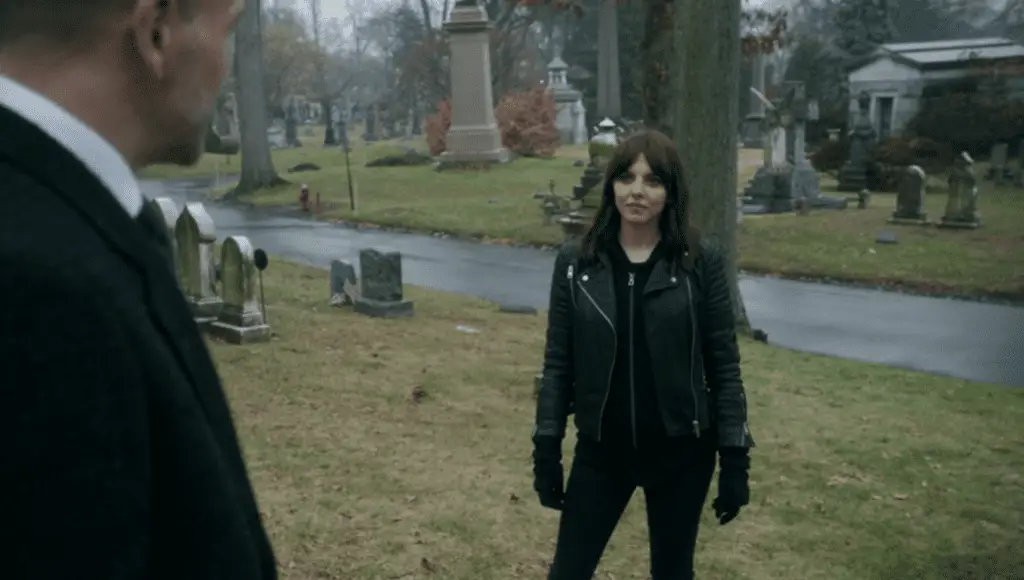
Kitty tells Sherlock that she’s sure that Durning’s death wasn’t natural, and that she fears more deaths will come. More is revealed back at the brownstone with Joan, who tries to hug Kitty and is tragically denied. I’m not saying that Joan should hug Sherlock or Kitty, because I love that Elementary respects a person’s right to choose to not be touched. But if Joan wants a hug, she should be hugged. (I would be willing to volunteer, personally.)
Anyway. Four years ago, when Sherlock was first beginning Kitty’s detective training, the two of them worked a case in which an American, Eli Kotite, fatally hit a woman while driving drunk. Kitty and Sherlock helped bring him to justice; Durning was the prosecutor in the case. Kotite was sentenced to four years, during which time he was brutally beaten and paralyzed. Since his recent release, three men involved in his case, including Durning, died in apparently accidental ways. Kitty is certain this is no coincidence, and fears she and Sherlock may be next. Since Kotite is paralyzed, they don’t believe he’s the killer, but he could have hired someone.
Sherlock agrees they should investigate, and suggests that Joan and Kitty go talk to Captain Gregson while he meets with Kotite. Joan points out that might be kind of hard, considering that Kitty, you know, threw acid in Del Gruner’s face and then fled the country (not that he didn’t deserve it). But apparently Gruner never named Kitty as his attacker, in order to avoid connecting himself to her own assault. Upon her return to the U.S., Kitty wrote a letter to the captain apologizing for disappointing him, and the two of them are “square” now.
Joan looked exactly as suspicious of this as I felt. When Kitty left in season 2, her part in the Gruner case was represented as an insurmountable obstacle, and now it’s just no big deal? The letter seemed like a flimsy way for the writers to write themselves out of that corner, but I’m so happy Kitty’s back that I’m willing to let it go.
Kitty and Joan go talk to the captain, who is not only not angry to see Kitty, but hugs her. Again, mixed feelings. Still not sure I buy it, but more importantly, why does the captain get to hug her but not Joan? On the other hand, it was a very sweet moment that showed how much Kitty has healed from her trauma. Regardless, Gregson agrees to help Kitty and Joan with the case.
In a private moment, Joan attempts to ask Kitty what she’s been up to and where she’s staying now. She says she’s working with a group in London that helps rescue girls from human trafficking, which is a lovely detail, but other than that, Kitty is noticeably cagey. Upon receiving a mysterious text, she suddenly jumps up and leaves. Uh oh.
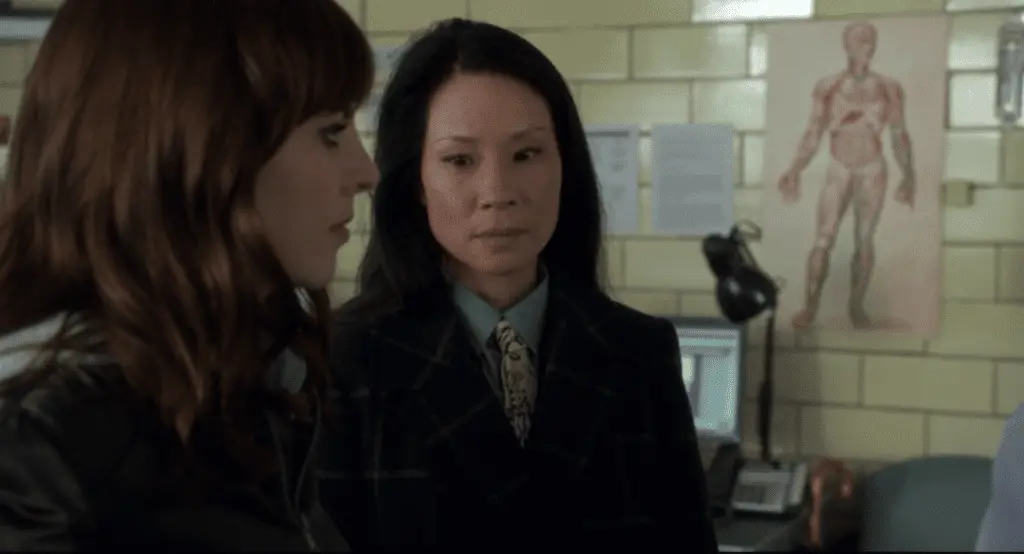
Meanwhile, Sherlock meets up with Kotite in a wealthy, private club. Kotite is without remorse for the death he caused and visibly smug about the deaths of the men involved in his case. However, he denies any responsibility, or even that the deaths were murders.
Without further leads, Joan and Sherlock go through the scant details in Durning’s file. Since the medical examiner ruled Durning’s death natural causes, there isn’t much there, but Joan notices in one picture that Durning’s shoes were tied in different ways. She theorizes that someone took off one of his shoes, injected something between his toes to trigger his cardiac episode, and then put his shoe back on. But without further evidence, they can’t exhume the body.
Joan asks Sherlock if he’s noticed anything strange about Kitty’s behavior, but he steadfastly denies it. In fact, he tells Joan that he has no reason to be concerned, because Kitty is not his friend, merely his former protege, whom he had fully expected to part ways from. To which I say, Yeah, okay, Sherlock. I seem to remember a certain someone vehemently promising that he would always be friends with Kitty, and actually having tears in his eyes when she told him that she loved him, but sure. Sure.
I was concerned, actually, that the show was going to try and insist that Sherlock doesn’t have an emotional connection to Kitty, but later events in the episode make it clear that’s not what was happening. Instead, this seems to be fairly classic Sherlock psychology. (Feelings that you don’t even have can’t hurt you, right? Right??)
Before Joan and Sherlock can try to find evidence that would merit them exhuming Durning’s body, someone digs up and burns his corpse. Sherlock, Joan, and Kitty (or, as I like to think of them, Detective Family) head out to investigate the scene along with Gregson. This grave desecration has pros and cons. On the one hand, there’s little chance of getting evidence off Durning’s body now. On the other, a case that had previously only been Kitty’s conspiracy theory is now proven to be real. Gregson promises them the full force of the NYPD. Sherlock finds something at the scene to help: short, dyed red hairs in the machinery used to dig up the body.
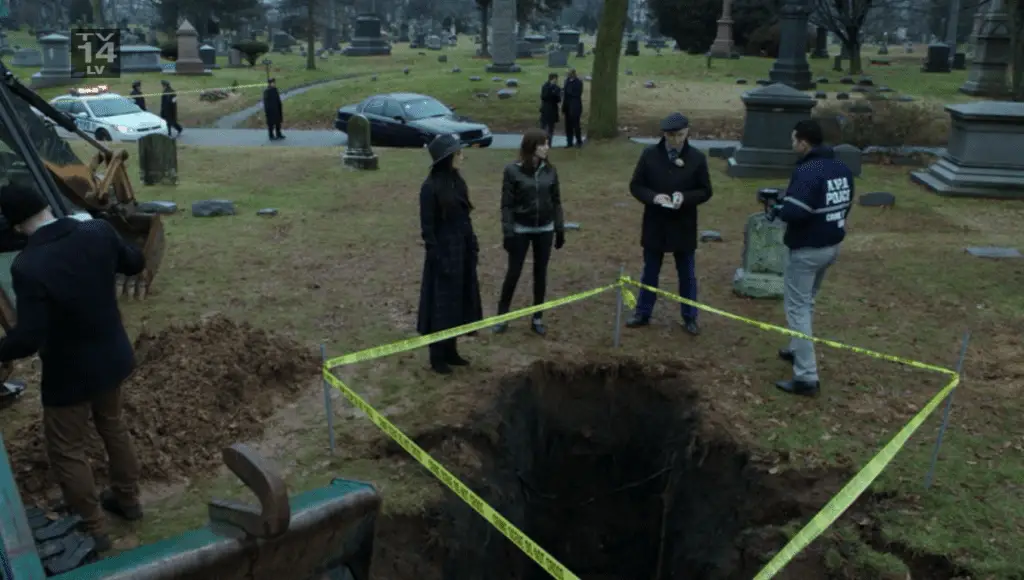
Joan and Kitty head out to speak to the M.E. that caught Durning’s case, Dr. Wilkerson, and ask her how she could have missed the evidence of murder. Wilkerson continues to insist there was nothing to miss. Joan politely accuses Wilkerson of not doing as thorough a job as possible. Kitty is less polite. When the M.E. continues to give them nothing, Kitty and Joan leave, both of them agreeing that she was lying. When Joan asks Kitty if she’s okay, more lying occurs, with Kitty insisting she’s just fine, and abruptly leaving again in response to text messages.
Sherlock and Bell talk to Durning’s widow about the day Durning died. She’s initially unhelpful, but when Sherlock mentions the red hairs he found, she recalls seeing a red haired man the day of her husband’s death. As she describes him, Sherlock comes to realize that he’s seen that exact man before, at Kotite’s club.
Further twists follow when Joan follows Kitty and breaks into a home she sees Kitty leaving. As she attempts to investigate the house in the dark, a shadowy figure leaps out and attacks her. Fortunately, before too much damage can be done, Kitty returns and orders the attacker to stop. Turning on the lights reveals Joan’s attacker to be an older woman with a European accent, who tells Joan that she’s…Kitty’s nanny?
So this is Kitty’s big secret. Upon her return to London, she encountered an old flame, and they struck up again. The relationship didn’t last, but it left her with a surprise: a baby boy. Kitty’s a mom now. (I’m sorry, a mum.) When Joan presses, she confesses that the reason she concealed it from Joan and Sherlock was that, once the Kotite case ends, she intends to give up being a detective and work as a counsellor for the human rights group she mentioned before. She was afraid that Sherlock wouldn’t take the news well.
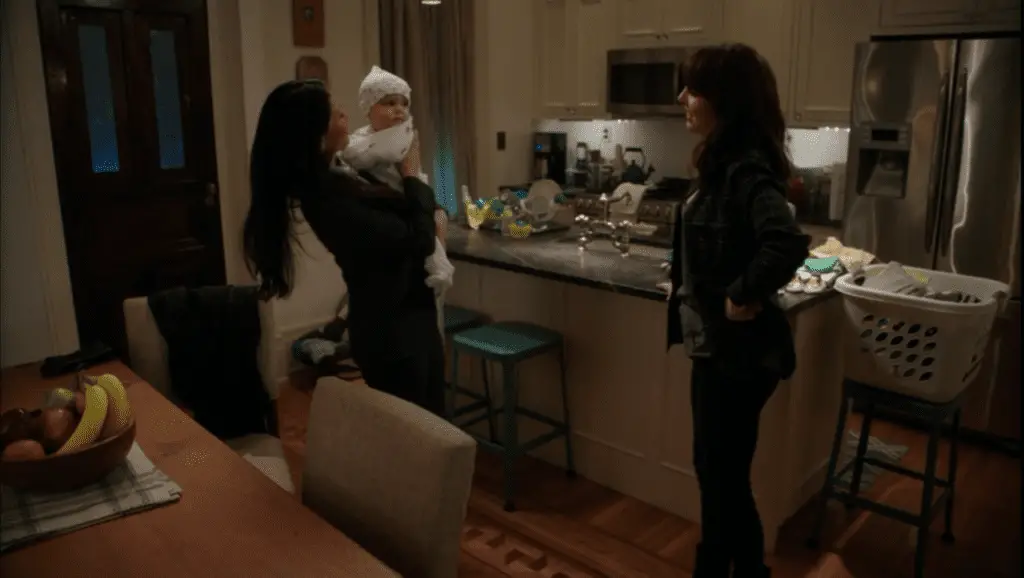
So. You know who didn’t take the news well? Me. I am not happy. For one thing, I can’t help but feel that the writers wanted to show us, the audience, that Kitty has recovered from her trauma and is now “happy,” and decided the best way to do that was throw a baby at her. Because apparently having a baby guarantees happiness. This frustrates me because it’s a pattern in fiction and especially tv shows. Any time a show wants to demonstrate that a woman has achieved a “happy ending,” suddenly she has a baby. The Parks and Rec finale, for instance, was practically drowning in babies.
I shouldn’t have to say this, but having a baby is not the only way for a woman to achieve happiness. It’s insulting, and Kitty quitting being a detective is the proverbial “adding insult to injury.” Season 2 repeatedly showed us Kitty insisting that she wanted to be a detective, that she felt like it was what she was meant to do, that it was helping her heal and giving her focus. Why does she have to give up on her life’s calling because she has a baby? I acknowledge that being a detective, particularly the way the characters on this show do it, is not always the safest line of work. Now Kitty has a baby, she should indeed put that first. But hey, just because Sherlock is lowkey self destructive and loves to throw himself in the path of danger doesn’t mean Kitty has to be the same.
Couldn’t she work a desk job for a bit? Or work part time, or purposely take safer gigs? Even if she had said, “I’m quitting now, but when he’s a little older I’ll get back to it,” I would have taken that. But the fact that she says she’s quitting, full stop, speaks to sexist stereotypes that I would have thought Elementary was better than. It suggests that being a mother is a woman’s entire identity and purpose. That women have no life outside their children. That women should stop working when they have a baby.
Now, to be clear, I am not saying that it’s a bad thing if a woman chooses to stop working when she has children. Western and particularly American culture makes it difficult for a woman to have both a career and a baby, and even if that weren’t true, women are free to make whatever choices they like and do whatever they think is best. As a twenty two year old who can only barely handle the responsibility of having a dog, it would be pretty messed up for me to judge someone for how they run their life and care for their baby.
However, Kitty is not a real person, she’s a fictional character, and her actions can and do represent subconscious ideas of how women “should” behave. Those ideas are then sent out into the world to further feed into our culture’s ideas about gender roles. I can’t help but think that Kitty’s baby and subsequent career choices represent and feed into old-fashioned, harmful ideas about “a woman’s place.” Elementary is usually good about critically considering cultural ideas on such varied topics as romance, gender, and sexuality, so I was disappointed they fell back onto such tired tropes here.
But anyway, the plot carries us ever on. The team gets Dr. Wilkerson’s financial information. Alone in the brownstone, Sherlock and Kitty go through the records and find evidence that an offshore account deposited money in Wilkerson’s account. Sherlock thinks he can use his father’s connections to trace the money. He also points out that Kitty is acting extremely jumpy, and she admits that someone important she wants Sherlock to meet is coming to the brownstone.
I may not be happy at the baby twist, but Sherlock meeting the baby was simultaneously poignant and amusing. Sherlock has an expression of horror usually reserved for men learning they have an illegitimate child…or for someone seeing an eldritch horror. At one point he literally just sort of points at it.
Before he and Kitty can talk about it, his phone rings. He answers it with the desperation of a drowning man reaching for a life float. It’s Kotite, who now admits the deaths of Durning and the others were indeed murders, but says that not only was he not responsible for it, but that he knows who is. He asks Sherlock to meet him at his club. Sherlock makes a show of refusing, but eventually agrees to go. Shocking no one, Kotite is then shown grabbing a gun before he leaves.
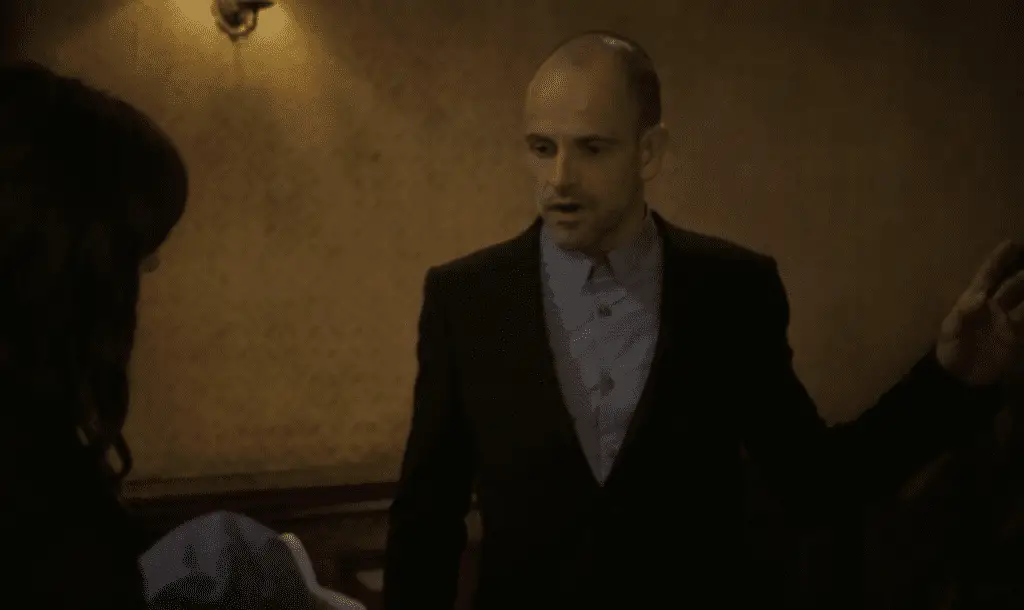
He doesn’t get very far. The next scene shows Kotite’s driver waiting outside the building for him, and then Kotite, very dead, landing on the car. No one can say for certain whether it was suicide or murder, but Sherlock thinks murder. Detective Family walk back to the brownstone together, debating details of the case. Joan points out that the security system in Kotite’s building went down just before the attack, which would require technological expertise.
As the three round the corner, Sherlock abruptly stops. The brownstone is swarming with FBI and military personnel. It would also, he says, take technological expertise to take down his own security systems, and he tells Joan to take Kitty somewhere safe. A bewildered Kitty asks if he thinks the government was behind this and if she was the target all along. Sherlock heads to the brownstone to find out. Inside, he finds the red haired man, who says he’s an intelligence agent. He has Sherlock arrested. Roll credits.
Is it bad that my first thought was, “Wow, that’s really weird, but at least it means Kitty is probably in the next episode too”?

